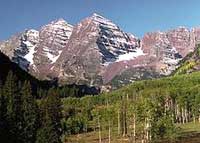It turns out that this “new economy” of ours may be just as subject to boom and bust as was the economy based on cattle, oil, and lumber. Last month’s terrorist attacks emptied Las Vegas, caused hunters to cancel trips to Idaho and Montana and silenced the phones for ski-resort reservations in Colorado.
The West’s environmental movement was also thrown off balance. You can’t easily push to protect an endangered species or attack an oil-seeking administration when lower Manhattan and the Pentagon are in ruins. From the other side of the public-land barricades, demand for oil and gas and aluminum airplanes is likely to be way down, so why spend money lobbying to “open” the Arctic when you can’t afford to drill there anyway?
There’s also bound to be less national attention to go around. Washington, D.C., is where much of the West’s business has always been done. During the Clinton years, the West’s federal lands were tightly managed out of the White House — from roadless policy and national monuments to individual timber cuts and national forest plans.
Congress has been even more involved with the West, earmarking funds for individual on-the-ground projects in ranger districts, wildlife refuges, and national parks. The flow of money and attention is so specific they shouldn’t call it pork; that’s too general. They should call it cutlet or chop, or tenderloin for the big appropriations.
Congress and the president have always micro-managed the West. John Wesley Powell spent most of his time not exploring but finagling a few thousand dollars a year out of Congress to buy tents and horses. Whether you want to build a dam or take one down, open a mine or reclaim an abandoned one, or trade a piece of federal land near Phoenix for a private ranch near Sedona, you are going to shuttle back and forth between your home in the West and Washington, D.C, to get it done.

The White River National Forest
outside Aspen, Colo.
Photo: USDA Forest Service.
But now, Congress and the White House may not have the time or money to manage the Baca Ranch in New Mexico or to argue over how many weeks to extend the comment period for Colorado’s recreation-rich White River National Forest.
A different environmental agenda may also move front and center. Brent Blackwelder, who runs Friends of the Earth out of the capital, notes that environmentalists have long urged rail transportation, wind and solar energy, and decentralized electric power generation. Each would make us less vulnerable to sabotage while being much easier on the land.
In the pre-Sept. 11 political climate, they didn’t have a prayer. Things may be different now.
That’s the potential new politics. But politics doesn’t change in a vacuum. Political shocks lead to economic shocks, and the new Western economics are likely to be a 21st-century version of the bust of the 1980s, when oil shale and pipeline and power plant projects died in the wake of falling energy prices.
We exported U-Hauls for a while, and then the region went into a deep sleep until it was roused in the early 1990s by the rough kiss of recreation development and increased westward immigration.
Opportunity Knocks
The energy bust was brutal on individuals, but a lot of damage to land and wildlife and beauty was avoided. In some ways, the bust was also good for towns. Those who stuck with their communities came together to clean up riverbanks, provide put-in places, and build trails along them. Residents worked to acquire key pieces of public land from cash-strapped sellers, adding acreage to the public estate; they also built recreation centers and libraries. Paradoxically, low cash flow and difficult times meant civic improvement because citizens had time on their hands.
With pressure to develop decreasing and property values falling with the stock market, we may again have the opportunity to strengthen communities and the West’s public lands. Worker housing may no longer be an oxymoron in some resort towns, and a market may open for those who figure out how to convert trophy homes into bed-and-breakfasts.
The region may also become more cohesive. As the flood of newcomers decreases or at least slows, those who came to the West in the 1990s may be forced to decide whether to move on or to commit to wherever they found themselves living when the economic music stopped.

